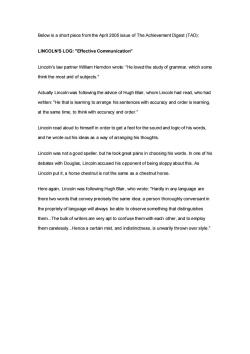《新编大学英语》综合教程(第三版第四册)B4U2_self-market_self-reading_Effective Communication

Below is a short piece from the April 2005 issue of The Achievement Digest(TAD): LINCOLN'S LOG:"Effective Communication" Lincoln's law partner William Herndon wrote:"He loved the study of grammar,which some think the most arid of subjects." Actually Lincoln was following the advice of Hugh Blair,whom Lincoln had read,who had written:"He that is learning to arrange his sentences with accuracy and order is learning, at the same time,to think with accuracy and order." Lincoln read aloud to himself in order to get a feel for the sound and logic of his words, and he wrote out his ideas as a way of arranging his thoughts. Lincoln was not a good speller,but he took great pains in choosing his words.In one of his debates with Douglas,Lincoln accused his opponent of being sloppy about this.As Lincoln put it,a horse chestnut is not the same as a chestnut horse. Here again,Lincoln was following Hugh Blair,who wrote:"Hardly in any language are there two words that convey precisely the same idea;a person thoroughly conversant in the propriety of language will always be able to observe something that distinguishes them...The bulk of writers are very apt to confuse them with each other,and to employ them carelessly...Hence a certain mist,and indistinctness,is unwarily thrown over style
Below is a short piece from the April 2005 issue of The Achievement Digest (TAD): LINCOLN'S LOG: "Effective Communication" Lincoln's law partner William Herndon wrote: "He loved the study of grammar, which some think the most arid of subjects." Actually Lincoln was following the advice of Hugh Blair, whom Lincoln had read, who had written: "He that is learning to arrange his sentences with accuracy and order is learning, at the same time, to think with accuracy and order." Lincoln read aloud to himself in order to get a feel for the sound and logic of his words, and he wrote out his ideas as a way of arranging his thoughts. Lincoln was not a good speller, but he took great pains in choosing his words. In one of his debates with Douglas, Lincoln accused his opponent of being sloppy about this. As Lincoln put it, a horse chestnut is not the same as a chestnut horse. Here again, Lincoln was following Hugh Blair, who wrote: "Hardly in any language are there two words that convey precisely the same idea; a person thoroughly conversant in the propriety of language will always be able to observe something that distinguishes them...The bulk of writers are very apt to confuse them with each other, and to employ them carelessly...Hence a certain mist, and indistinctness, is unwarily thrown over style
按次数下载不扣除下载券;
注册用户24小时内重复下载只扣除一次;
顺序:VIP每日次数-->可用次数-->下载券;
- 《新编大学英语》综合教程(第三版第四册)B4U2_self-market_background information.doc
- 《新编大学英语》综合教程(第三版第四册)B4U2 Translation & Writing.ppt
- 《新编大学英语》综合教程(第三版第四册)B4U2 Read by critical thinking.ppt
- 《新编大学英语》综合教程(第三版第四册)B4U2 QUIZ_oral quiz.ppt
- 《新编大学英语》综合教程(第三版第四册)B4U2 QUIZ_06B4U02 QUIZ.doc
- 《新编大学英语》综合教程(第三版第四册)B4U2 Menu.ppt
- 《新编大学英语》综合教程(第三版第四册)B4U2 Activate.ppt
- 《新编大学英语》综合教程(第三版第四册)B4U1_self-market_vocabular and grammar.doc
- 《新编大学英语》综合教程(第三版第四册)B4U1_self-market_self-writing_如何表达总论点1.doc
- 《新编大学英语》综合教程(第三版第四册)B4U1_self-market_self-reading_How Christie Wrote.doc
- 《新编大学英语》综合教程(第三版第四册)B4U1_self-market_self-reading_About leisure time.doc
- 《新编大学英语》综合教程(第三版第四册)B4U1_self-market_self-listening_phelps.doc
- 《新编大学英语》综合教程(第三版第四册)B4U1_self-market_For teachers.doc
- 《新编大学英语》综合教程(第三版第四册)B4U1_self-market_background information.doc
- 《新编大学英语》综合教程(第三版第四册)B4U1 Translation & Writing.ppt
- 《新编大学英语》综合教程(第三版第四册)B4U1 Read by critical thinking.ppt
- 《新编大学英语》综合教程(第三版第四册)B4U1 QUIZ_oral quiz.ppt
- 《新编大学英语》综合教程(第三版第四册)B4U1 QUIZ_06 B4U01 QUIZ.doc
- 《新编大学英语》综合教程(第三版第四册)B4U1 Menu.ppt
- 《新编大学英语》综合教程(第三版第四册)B4U1 Activate.ppt
- 《新编大学英语》综合教程(第三版第四册)B4U2_self-market_self-reading_The Power of Words-different authors.doc
- 《新编大学英语》综合教程(第三版第四册)B4U2_self-market_self-reading_The power of words-Parenting.doc
- 《新编大学英语》综合教程(第三版第四册)B4U2_self-market_self-writing_如何表达总论点2.doc
- 《新编大学英语》综合教程(第三版第四册)B4U2_self-market_vocabulary and grammar.doc
- 《新编大学英语》综合教程(第三版第四册)B4U2_Teacher 1, Bk 4 [Final to fltrp].doc
- 《新编大学英语》综合教程(第三版第四册)B4U4 Activate.ppt
- 《新编大学英语》综合教程(第三版第四册)B4U4 Menu.ppt
- 《新编大学英语》综合教程(第三版第四册)B4U4 QUIZ_oral quiz.ppt
- 《新编大学英语》综合教程(第三版第四册)B4U4 QUIZ_Unit Four QUIZ.doc
- 《新编大学英语》综合教程(第三版第四册)B4U4 Read by critical thinking.ppt
- 《新编大学英语》综合教程(第三版第四册)B4U4 Translation & Writing.ppt
- 《新编大学英语》综合教程(第三版第四册)B4U4_sample.doc
- 《新编大学英语》综合教程(第三版第四册)B4U4_self-market_06B404 QUIZ_sentence unit4.ppt
- 《新编大学英语》综合教程(第三版第四册)B4U4_self-market_06B404 QUIZ_Unit Four QUIZ.doc
- 《新编大学英语》综合教程(第三版第四册)B4U4_self-market_background information.doc
- 《新编大学英语》综合教程(第三版第四册)B4U4_self-market_self-listening_never too young.doc
- 《新编大学英语》综合教程(第三版第四册)B4U4_self-market_self-reading_16 habits of highly creative people.doc
- 《新编大学英语》综合教程(第三版第四册)B4U4_self-market_self-reading_Enhancing Creativity in your children by blogging.doc
- 《新编大学英语》综合教程(第三版第四册)B4U4_self-market_self-reading_Unleashing the power of creativity.doc
- 《新编大学英语》综合教程(第三版第四册)B4U4_self-market_self-writing_如何写分论点(2).doc
